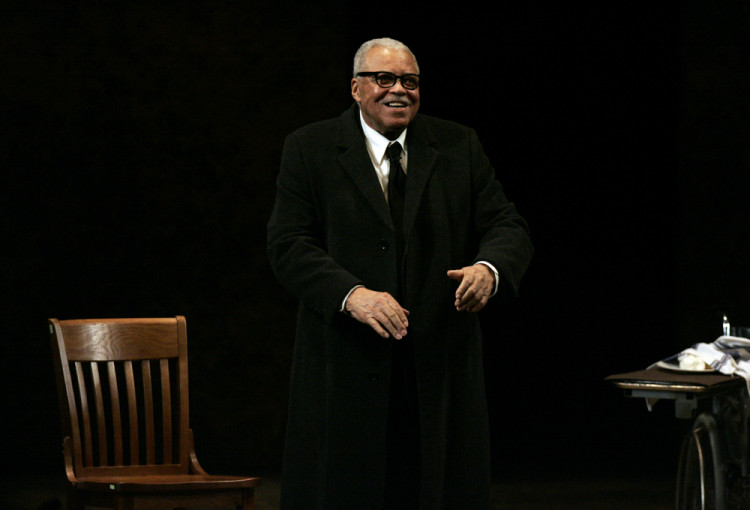Hearing James Earl Jones's recognizable baritone voice, which could be forceful at times, comforting at other times, and always rich and velvety, was as much a part of the experience of going to the movies for millions of movie fans as purchasing a tub of popcorn.
Over the course of his six-decade career, he appeared in a large number of films; nevertheless, he is most well-known for two vocal roles: Darth Vader in the "Star Wars" saga and Mufasa in Disney's animated masterpiece "The Lion King." Despite this, Jones never considered his skill to be anything particularly remarkable.
"You know, I don't hear the voice you hear. I'm not party to the Darth Vader tone," he said to The New York Times in 2014. "All I'm doing is using the voice I have to try to be as clear as I can with the language I'm using."
Jones passed away on September 9, at the age of 93, from causes that were not reported at the time of this publication. His voice was no longer heard. His son, Flynn Earl Jones, who is 41 years old, is the only person he leaves behind. He was married to actress Cecilia Hart for 34 years, and she passed away in 2016, PEOPLE Magazine.
While Hollywood was mourning the loss of a legend, Jones was remembered by Kevin Costner, who had played alongside him in the film "Field of Dreams", recalling "that booming voice. That quiet strength. The kindness that he radiated... I'm grateful to have been a witness to him making that magic happen."
Jones was a Broadway mainstay who also had appearances in commercially successful films such as "Coming to America" and "The Hunt for Red October." He was awarded three Tony Awards, three Emmys, a Grammy, and an honorary Oscar after his work. One of the winners of the EGOT, he had no ego.
"I was as content Off-Broadway as I was in a big Hollywood movie," he once said.
He struggled with speech at an early age, which is ironic considering that he was the man who read Shakespearean soliloquies and said four of the most famous sentences in the history of cinema, including "I am your father."
After being born in Arkabutla, Mississippi, in 1931, he was moved to live with his grandparents in Michigan when he was approximately 5 years old. His mother, Ruth, worked as a maid, while his father, Robert Earl Jones, worked as a butler and driver.
Jones described the circumstances surrounding his father's departure from the family in order to pursue a career in acting as "traumatic" in an interview with the Academy of Achievement in the year 1996.
When he got to Michigan, "I was a stutterer. I couldn't talk. So my first year of school was my first mute year, and then those mute years continued until I got to high school," remembered Jones.
At that school, Jones was encouraged by a teacher to create and read poetry, which assisted him in discovering his voice.
"The written word is safe for the stutterer. The script is a sanctuary," he said in his 1993 memoir “Voices and Silences”.
In 1955, after completing his studies in drama at the University of Michigan, he relocated to New York in order to pursue a career in performing. It was then that he reconciled with his father, who was also a struggling theatrical performer.
"I got a little job here and a job there, but it wasn't going well," Jones recalled.
During the year 1962, Jones was offered a role in a Shakespeare in the Park production of "The Merchant of Venice." At the same time, the renowned director Stanley Kubrick, who was cast in the role of "Dr. Strangelove," attended a show to assess Jones's performance alongside George C. Scott.
"Kubrick said, 'I'll take the Black one too,’" Jones told The New York Times. "That's not what he actually said, but that's the way I like to put it."
As a result of playing a bombardier in the political satire, he was offered more lucrative jobs. In 1968, he won a Tony Award for his performance as a boxer in the Broadway play "The Great White Hope," which was based on the legendary boxer Jack Johnson.
He later repeated the role in a film in 1970, which earned him his only nomination for an Academy Award in the category of Best Actor. It was in 2011 when he was presented with his honorary Oscar. As a result of an unexpected success in the science fiction genre, Jones was unexpectedly catapulted into the stratosphere of celebrity.
The director of "Star Wars," George Lucas, cast David Prowse, a 6'6" bodybuilder, in the role of Darth Vader, the villain, for the 1977 film. However, Lucas believed that Prowse's vocals were not quite up to par.
"George wanted, pardon the expression, a dark voice," Jones said to the American Film Institute in 2010. In total, he was only paid $7,000. "I thought that was good money," he said.
Following the dissolution of his first marriage to Julienne Marie, an actress and singer, Jones fell in love with fellow theater veteran Hart while they were working together on the production of the 1979 detective series "Paris."
"She made me laugh. She was stimulating. And she did not seem to take me seriously at all, which meant I could relax and be myself with her," he wrote in his memoir.
Family guy was Jones's favorite part, despite the fact that he enjoyed his work very much. According to what he wrote, his wife and son "are my anchorage."
Jones was never able to find another part that was as legendary as Vader, but he came close with Mufasa, the wise King of Pride Rock and the father of infant Simba, in "The Lion King." A younger generation of fans became enamored with him as a result of the highest-grossing film of 1994, which brought him a great deal of satisfaction.
"The stories that become popular," Jones said, "are sometimes the best."






